- Home
- Joel C. Rosenberg
Israel at War: Inside the Nuclear Showdown With Iran Page 3
Israel at War: Inside the Nuclear Showdown With Iran Read online
Page 3
Most Israeli military analysts agree that Israel’s capabilities are so limited that bombing Iran would only delay Iran’s nuclear program, not destroy it. The United States has supplied Israel with bunker-buster bombs, but to be prepared to strike Iran, the Israelis would need at least two hundred more advanced bombs in addition to other war tools such as midair-refueling tanker planes.
Jeffrey Goldberg is another astute Middle East expert as well as a journalist who is personally close to Netanyahu. Indeed, he has written some of the most informative and perceptive articles in recent years about the thinking of the prime minister and his inner circle on the Iran issue. On August 11, 2012, exactly one month after the Raviv-Melman article, Goldberg published a column in the magazine The Atlantic headlined “7 Reasons Why Israel Should Not Attack Iran’s Nuclear Facilities.”37 Goldberg made clear he was not saying Netanyahu would not order a strike. “I’m not going to guess whether Israel will strike Iran tomorrow, next month, next year, or never,” he wrote. “I believe it is highly plausible that Netanyahu and [Israeli defense minister Ehud] Barak will do so at some point over the next twelve months, if current trends remain the same.” But Goldberg wanted to be clear he believed a preemptive strike would be a terrible idea and should be avoided at all costs.
He made seven points:
Innocent people will die.
It might not work at all.
Even if a strike does work, it may only delay the Iranian program, and it might even speed it up.
An Israeli strike may cause a surge of sympathy for Iran among Sunni Arabs, who right now despise the regime for, among other reasons, supporting the Assad government in Damascus.
A strike could trigger an overt war without an obvious end, and an all-out missile war could escalate into something especially horrific. In essence, Israel would be trading a theoretical war later for an actual war now.
A strike could be a disaster for the U.S.-Israel relationship. It might not be—there is little sympathy for the Iranian regime among Americans (except on the extreme leftmost and rightmost margins), and there is plenty of sympathy for Israel. But an attack could trigger an armed Iranian response against American targets.
The current American president is deeply serious about preventing Iran from going nuclear. Many experts believe he would eventually use force (more effectively, presumably, than Israel) to stop Iran from crossing the nuclear threshold. His position will be severely compromised if Israel jumps the gun and attacks now.
What should one make of such analyses? The writers who made them are certainly experts in Middle East affairs. They are experienced. Their arguments are interesting and in some cases compelling. But in the end, are they right? Are these arguments that Netanyahu and his closest advisors would find not simply compelling but convincing?
The answer depends on what Netanyahu truly believes about the nature of the Iranian leadership and what he believes about the magnitude and imminence of the threat Iran now poses.
Chapter Three
What Netanyahu Believes
“How much time does the West have to make a decision to act decisively to stop Iran from building and deploying operational nuclear warheads?”
This was the question I asked Benjamin Netanyahu as I interviewed him in March of 2007 at his office in Tel Aviv.
“Not much,” he replied. “We are running out of time. I can’t tell you if it’s a period of months or a few years. Certainly no more than a few years.”
At the time, I noted that India and Pakistan—two friends of the United States—had both tested nuclear weapons in the spring of 1998 within days of each other, stunning analysts in most Western intelligence agencies, including the CIA. Such analysts knew those countries were slowly developing their nuclear technology. But they had no idea that either country—much less both—had completed building nuclear warheads and was ready and able to successfully test them. Given that Netanyahu was prime minister of Israel during this period, I asked how he viewed such nuclear surprises and how they factored into his thinking about how to protect Israel.
Netanyahu agreed that the Indian and Pakistani nuclear breakouts were sobering because they showed how even the best intelligence agencies can miss crucial developments—even when they are closely monitoring the situation. He noted that a full two years before the Indian and Pakistani surprises, he had begun to warn world leaders publicly and privately that a nuclear showdown with Iran was coming and that Iran must be prevented from building atomic weapons at all costs.
“Among the first things I did, after I was elected prime minister [in 1996], was to speak before a joint session of the U.S. Congress,” he explained. “I said that the greatest danger the world faces is the arming of Iran with nuclear weapons. What was true ten years ago is doubly true today—not doubly, triply. But I couldn’t get the leading powers of the world—including the U.S. administration at the time—to focus on this danger and to stop the shipment of nuclear and ballistic technology to Iran from many countries, including Russia. I could not get the U.S. to focus on this. I think today people understand the danger. It’s much more advanced. It has moved forward. Could we be surprised tomorrow? Well, we were surprised by the extent of Libya’s advancement in its nuclear program. Happily, it was dismantled, probably as a result of the deterrent effect of [Libyan leader Muammar] Gaddafi seeing Saddam Hussein [captured] in a hole [and] realizing that he too could hang by the end of a rope. But no such deterrence necessarily works on the true believers in Tehran. Therefore, our focus should not be on deterrence but on prevention.”
Netanyahu then explained to me why the stakes were so high. The Iranian leaders, he said, “want to concentrate on completing their nuclear program because once they have that, then they could threaten the West in ways that are unimaginable today. They could take over the Persian Gulf on all its sides and take control of the oil reserves of the world. They could topple Saudi Arabia and Jordan in short order and, of course, Iraq. All your internal debates in America on [the future of] Iraq would be irrelevant because nuclear-armed Iran would subordinate Iraq in two seconds. Then they would threaten to create a second Holocaust in Israel and proceed on their idea of building a global empire, producing twenty-five atomic bombs a year—250 bombs in a decade—with missiles that they are already working on [and that they want to develop] to reach the eastern seaboard of the United States. Everything else pales in comparison to this development. This has to be stopped, for the sake of the world, not only for the sake of Israel.”
At the time of this particular interview, Netanyahu was not prime minister of Israel. His rival Ehud Olmert was. Netanyahu was not even a cabinet member. He had been shut out of the government since Olmert and Ariel Sharon left the Likud Party in 2005 to create their own centrist Kadima Party, splitting and essentially gutting Likud. At the time, Netanyahu was a member of the Knesset and a member of the opposition. His Likud Party held only twelve seats in Israel’s 120-seat parliament. A shell of its former greatness, Likud was in its weakest political position since its creation by Menachem Begin in 1973, when the party captured a stunning thirty-nine seats.
Today, of course, everything is different. Netanyahu is no longer an observer; he is Israel’s commander in chief. The decision to stop Iran—or not—is not someone else’s to make; it is his.
Who Is Benjamin Netanyahu?
What surprises people who don’t know Netanyahu’s history is that in his younger years he never planned on a career in politics—much less ascending to the prime minister’s office. To the contrary, he wanted to go into business. Though he did briefly study politics at Harvard, he actually holds a bachelor’s degree in architecture and a master’s degree in management from the Massachusetts Institute of Technology. His first jobs out of college weren’t in government; they were in business. From 1976 to 1982, Netanyahu worked in the private sector, including a stint with the Boston Consulting Group, a global business consultancy, where he first met and worked side by side with Mitt
Romney, who years later would win the Republican nomination for president of the United States.
Born in Tel Aviv on October 21, 1949, just a year after the prophetic rebirth of the State of Israel, Benjamin Netanyahu—widely known to family and friends by his nickname, “Bibi”—entered the world in the immediate aftermath of his nation’s War of Independence. He was born into a somewhat-secular Jewish family, one that was, like so many Jewish families, reeling from the horrors of the Holocaust. His father, Benzion Netanyahu, was an acclaimed Jewish historian. Bibi, his older brother, Yonatan, and his younger brother, Iddo, were taught from an early age that Jews had been isolated and hunted and persecuted and murdered throughout history and had to learn to defend themselves and the land of their forefathers.
“Jewish history is a history of holocausts,” Benzion Netanyahu once said.38
It was a truth Bibi never forgot. After Yonatan became a commander in the country’s most elite army unit, the Sayeret Matkal, Bibi worked hard to secure a coveted spot in “the Unit” as well—a spot he eventually earned. When “Yoni” was killed in an operation to rescue Israeli hostages held in Entebbe, Uganda, in 1976, Bibi was deeply shaken by the loss. But he resolved to uphold his brother’s legacy of defending the Jewish people.
In a fascinating twist of history, it was during this period in the mid-1970s that Bibi got to know Ehud Barak and Shimon Peres. Barak was Yoni’s superior in the IDF, and for a time, he was Bibi’s commander as well. Shimon Peres, meanwhile, was Israel’s defense minister. When Yoni was killed in Entebbe, it was Barak who personally informed Bibi of the news, and Barak and Peres together helped comfort and honor the Netanyahu family. Both men attended Yoni’s funeral and played critical roles in a formative time of Bibi’s life.
That said, Peres and Barak were both members of the left-of-center Labor Party. In time, Bibi gravitated to the right-of-center Likud Party. When Bibi first became prime minister in 1996, he did so by defeating Peres in an incredibly narrow election that came down to just a handful of votes. When Bibi lost the premiership in 1999, he did so to Barak, who was suddenly a fast-rising star on the Israeli political scene.
Yet upon being elected prime minister again in 2009, Bibi immediately reached out privately and sincerely to both men. Promising to put past political rivalry aside, Bibi asked Barak to join his government as defense minister in order to design a feasible plan of attack against Iran and to prepare the Israel Defense Forces for the most difficult mission of its modern existence. Few expected Barak to say yes, given the deep political divisions and scars of past fights between the two men. Indeed, most grassroots Labor Party members were apoplectic at the idea that Barak would even consider Netanyahu’s offer. They despised Netanyahu and urged Barak to steer clear of a deal. Yet in stunning defiance of his party’s animosity, Barak said yes.
Peres, meanwhile, is Israel’s president and at eighty-nine is both Bibi’s and Barak’s elder statesman. All three men still harbor strong disagreements over policy and politics. But all three men see the existential danger Israel faces today. Their relationships were forged in the most devastating personal crisis of Bibi’s life, and in recent years these men have found themselves working together closely to prevent Iran from getting the Bomb.39
How Does Netanyahu See the Enemy?
Central to understanding how Netanyahu makes decisions is his view of the nature of the enemy Israel and the world faces. At his core, he believes the mullahs in Iran are driven by radical Islamic theology as well as by immense personal and national ambition.
To understand the current Iranian regime, Netanyahu believes one must first understand the nature of the Islamic Revolution that occurred in 1979. At the time, and in the years that followed, Iran’s Supreme Leader, Ayatollah Ruhollah Khomeini, vowed to establish a global Islamic empire with Iran as its head.
“The governments of the world should know that . . . Islam will be victorious in all the countries of the world, and Islam and the teachings of the Qur’an will prevail all over the world,” Khomeini declared in January 1979, just before he returned to Tehran from exile in Paris to seize power.40
The following year, once in full control of Iran, Khomeini said, “We must strive to export our Revolution throughout the world.”41 During this time, he declared war on the United States and Israel, and every Friday when he delivered his weekly sermon in Tehran, hundreds of thousands of Shia Muslims joined him in chanting, “Death to America! Death to Israel!”
Since then, successive leaders of Iran have repeatedly vowed to annihilate the “Little Satan” and the “Great Satan.”
“It is the mission of the Islamic Republic of Iran to erase Israel from the map of the region,” said Iran’s current Supreme Leader, Ayatollah Ali Khamenei, in 2001.42
“One bomb is enough to destroy Israel. . . . In due time the Islamic world will have a military nuclear device,” declared then–Iranian president Akbar Hashemi Rafsanjani that same year.43
“Israel must be wiped off the map,” Iran’s current president, Mahmoud Ahmadinejad, famously insisted in 2005.44
In 2006, Ahmadinejad added, “Like it or not, the Zionist regime is heading toward annihilation. . . . The Zionist regime is a rotten, dried tree that will be eliminated by one storm . . . [because] its existence has harmed the dignity of Islamic nations.”45
In 2008, Ahmadinejad vowed that “the Zionist regime (Israel), with a 60-year record of genocide, plunder, invasion, and betrayal is about to die and will soon be erased from the geographical scene.”46
These are themes Iran’s leaders continue to hold and espouse publicly to this day. In February 2012, Supreme Leader Khamenei once again vowed publicly that the “cancerous tumor” of Israel “should be cut and will be cut” out of the Middle East.47
In August 2012, Ahmadinejad declared, “Anyone who loves freedom and justice must strive for the annihilation of the Zionist regime in order to pave the way for world justice and freedom.”48
Just a few days later, Khamenei reiterated that the greatest problem facing the Muslim world was how to handle Israel. “The great powers have dominated the destiny of the Islamic countries for years and . . . installed the Zionist cancerous tumor in the heart of the Islamic world,” Khamenei said, adding that “many of the problems facing the Muslim world are due to the existence of the Zionist regime.”49
Netanyahu believes such rhetoric is not mere rhetoric. To the contrary, he is certain that the Iranian leaders truly believe in the annihilation of Judeo-Christian civilization and are working to acquire the means to accomplish their genocidal goals. For decades, he notes, the leaders of Iran have feverishly sought to build, buy, or steal nuclear warheads and the ballistic missiles and terrorist networks necessary to deliver those warheads. The latest reports from the International Atomic Energy Agency indicate that Iran is continuing to illegally enrich uranium in violation of numerous U.N. Security Council resolutions. Iran currently has enough uranium to build at least seven nuclear warheads, possibly more. The IAEA also has evidence suggesting Iran is actively seeking to build nuclear warheads and attach these warheads to ballistic missiles capable of reaching Israel.
Eschatology and Iranian Foreign Policy
What’s more, Netanyahu does not believe the Iranian regime can be deterred from using nuclear weapons if they acquire them. He is deeply concerned that the current leaders of Iran are driven by Shia Islamic End Times theology that tells them either to destroy Judeo-Christian civilization as we know it in order to hasten the coming of their so-called messiah, known as the Twelfth Imam or the Mahdi, or to prepare weapons of mass destruction for the Twelfth Imam to use to destroy the Western alliance on his own before establishing a global Islamic kingdom known as the Caliphate.
“I think the West misunderstood, and still misunderstands, the threat of radical Islam,” Netanyahu told me. “It is a fanatic, messianic ideology that seeks to have an apocalyptic battle for world supremacy with the West. It seeks to correct what it sees—and its di
sciples see—as an accident of history, where the West has risen and Islam has declined. The correction is supposed to be done by the resurrection of an Islamic empire and the acquisition of nuclear weapons and the use of nuclear weapons, if necessary, to obliterate Islam’s enemies, and to subjugate the rest. This is a pathological ideology, much like Nazism was. And it poses a threat, in my judgment, in many ways bigger than Nazism because Hitler embarked on a world conflict and then sought to achieve nuclear weapons, whereas the leading radical Islamic regime, Iran, is seeking to first acquire nuclear weapons and then embark on a world conflict. That is what is not yet understood in the West—and certainly, if it is understood, it is not acted upon.”
“Ahmadinejad is driven by an apocalyptic theory,” I agreed, “believing there are just a couple of years before the end of the world and the coming of the Islamic messiah. In your view, how is that driving Iranian foreign policy?”
“I think the world changes once Iran acquires nuclear weapons,” Netanyahu replied. “With this fanatic regime, it is almost akin to the Branch Davidians under David Koresh. . . . You know, it’s one thing if you have a crazy sect stuck up in some commune in Oregon or in a ranch in Waco, Texas. But when the wacko from Waco gets nuclear weapons and he wants to obliterate the United States and its allies, then you start worrying, and that’s what is happening in Iran. You think that these people are normal. You think that Iran would conform to the conceptions of deterrence and careful calculation of cost and benefit. But in fact, it is part of the Shiite stream of radical Islam. You’ve already seen what the Sunni stream does, which is to smash into buildings in Manhattan with collective suicide. And there’s no reason to believe that the militant Shiites, once they have atomic weapons, will not be suicidal. They say openly that they intend to remove Israel, the ‘Little Satan.’ But remember that their goal is to get the United States, the ‘Big Satan.’ We [in Israel] are just a station, one station, on the way to world conquest. And to have such a regime that believes in apocalyptic Armageddon with the West—in which millions will die on both sides, but the Muslim millions go to a Muslim heaven with all the trappings—to have that crazy ideology in charge of a country that is developing atomic weapons is unbelievably dangerous, and it should stop. Everything else is secondary to this.”

 The Copper Scroll
The Copper Scroll The Auschwitz Escape
The Auschwitz Escape The Last Jihad
The Last Jihad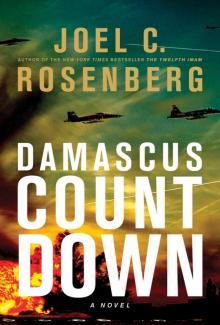 Damascus Countdown
Damascus Countdown The Persian Gamble
The Persian Gamble The Jerusalem Assassin
The Jerusalem Assassin Dead Heat
Dead Heat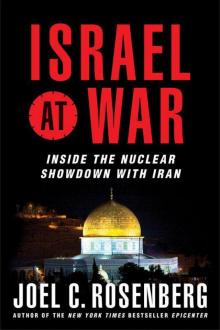 Israel at War: Inside the Nuclear Showdown With Iran
Israel at War: Inside the Nuclear Showdown With Iran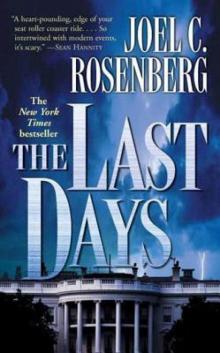 The Last Days
The Last Days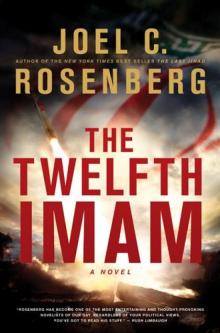 The Twelfth Imam
The Twelfth Imam Epicenter 2.0
Epicenter 2.0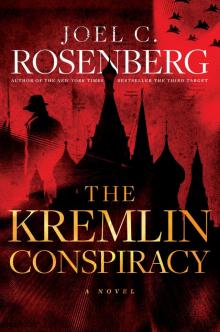 The Kremlin Conspiracy
The Kremlin Conspiracy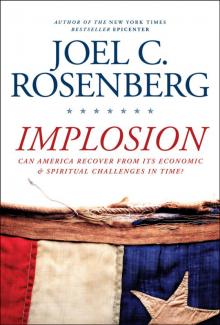 Implosion: Can America Recover From Its Economic and Spiritual Challenges in Time?
Implosion: Can America Recover From Its Economic and Spiritual Challenges in Time? The Third Target: A J. B. Collins Novel
The Third Target: A J. B. Collins Novel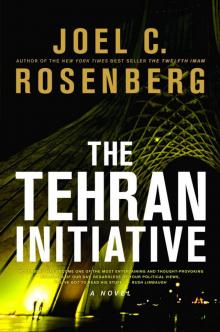 The Tehran Initiative
The Tehran Initiative Inside the Revolution
Inside the Revolution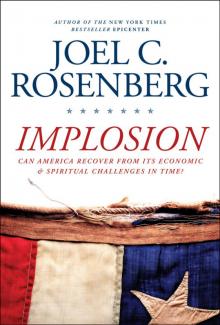 Implosion
Implosion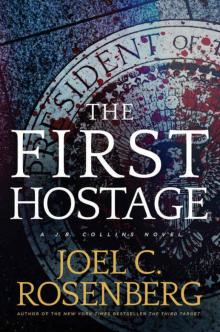 The First Hostage: A J. B. Collins Novel
The First Hostage: A J. B. Collins Novel